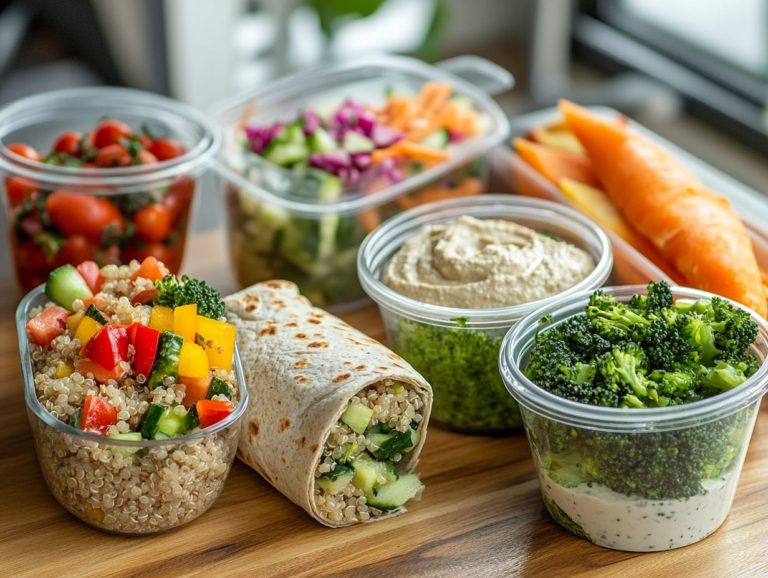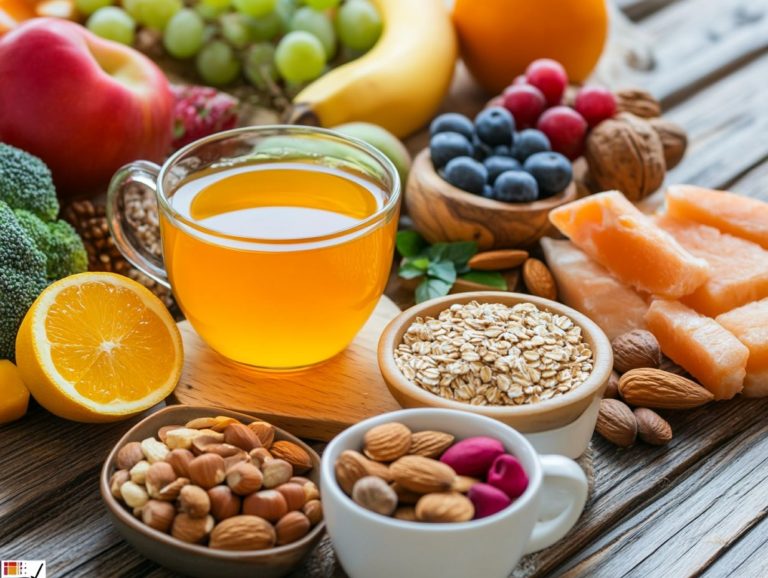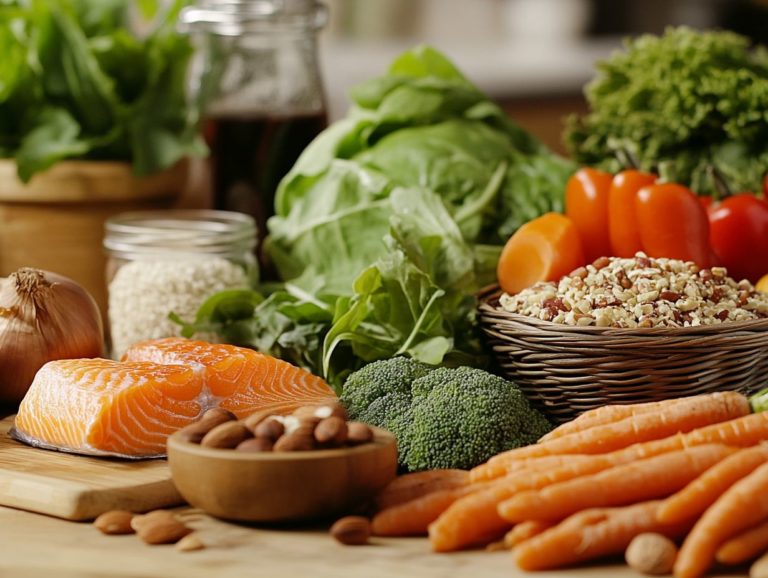Nutrition for Pregnant Women: What to Eat
Nutrition during pregnancy is absolutely essential for the health of both you and your baby.
From the vital vitamins and minerals to navigating cravings and those pesky food aversions, knowing what to eat can profoundly influence this transformative journey.
This article delves into the crucial nutrients you need, suggests nourishing foods, and provides insights for effective meal planning. You ll also discover guidance on supplements and the importance of consulting with healthcare providers.
Dive into this guide to ensure a healthy pregnancy for you and your little one!
Contents
- Key Takeaways:
- Importance of Nutrition During Pregnancy
- Essential Nutrients for Pregnant Women
- Recommended Foods for a Healthy Pregnancy
- Managing Pregnancy-Related Food Aversions and Cravings
- Healthy Meal Planning for Pregnant Women
- Supplements During Pregnancy
- Consulting with a Healthcare Provider
- Frequently Asked Questions
- What should pregnant women eat to support a healthy pregnancy?
- Are there any specific foods that pregnant women should avoid?
- Can pregnant women still eat seafood?
- What are some important nutrients for pregnant women to focus on?
- Can pregnant women follow special diets such as vegetarian or vegan?
- Is it okay to indulge in cravings during pregnancy?
Key Takeaways:
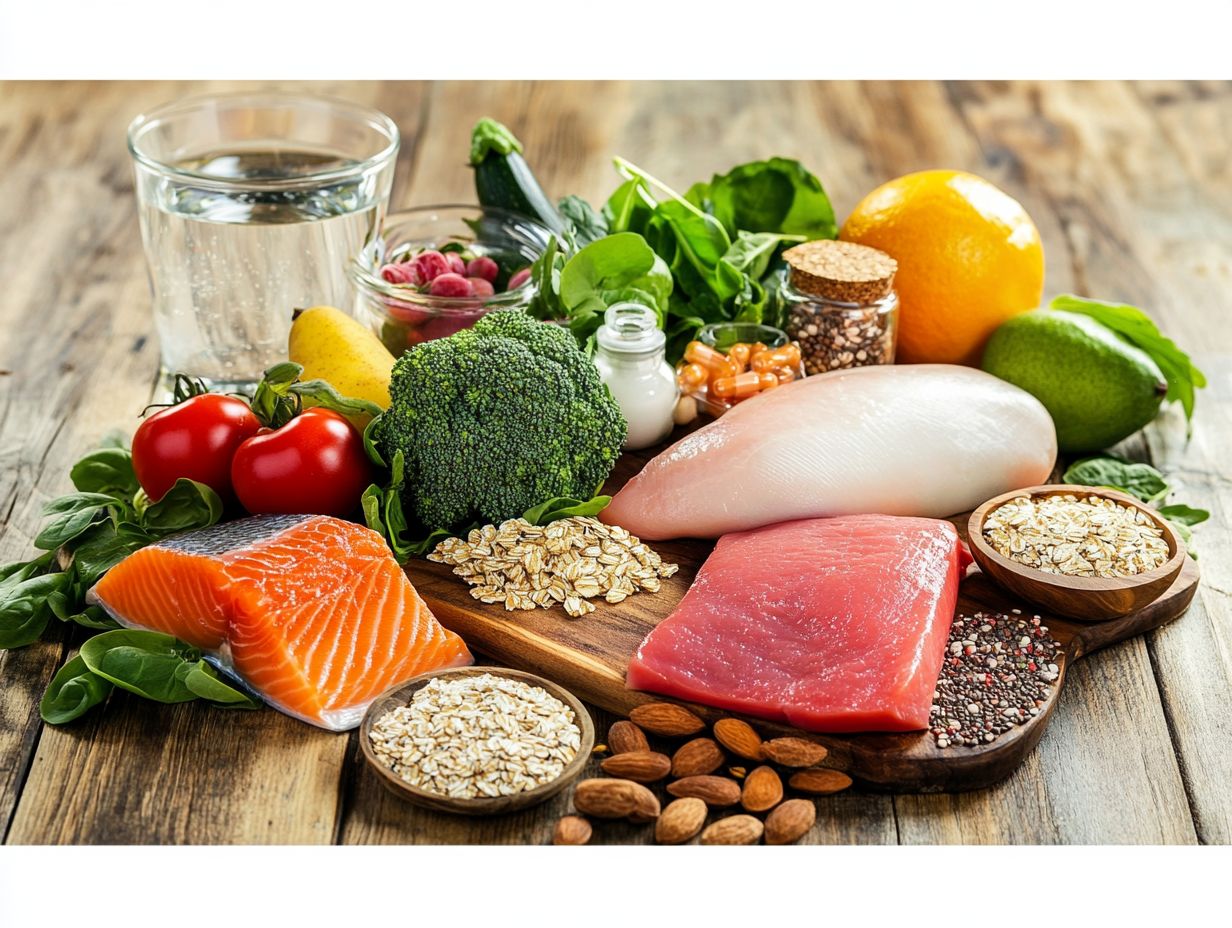
- Nutrition is crucial during pregnancy for the health of both the mother and baby.
- Focusing on essential nutrients like vitamins and minerals is important for a healthy pregnancy.
- Consulting with a healthcare provider and managing changes in appetite can help pregnant women plan and maintain a nutritious diet.
Importance of Nutrition During Pregnancy
Nutrition during pregnancy is crucial for your well-being and that of your developing baby. It sets the stage for a healthy pregnancy by ensuring that you receive the essential nutrients required to support fetal growth and your own health.
A well-rounded diet filled with vitamins, minerals, and other vital nutrients is important for preventing complications and promoting the best possible health outcomes. Esteemed organizations like the Mayo Clinic highlight the importance of proper nutrition in paving the way for a healthy start for both you and your baby, effectively minimizing the risks linked to inadequate dietary intake.
Effects on Mother and Baby
The effects of nutrition during pregnancy are profound, significantly influencing the health of both you and your baby by providing essential nutrients crucial for development and overall well-being.
Take folate, for instance; its proper intake is vital as it helps prevent serious brain and spine issues, known as neural tube defects, and supports the overall development of your baby’s brain and spine. Meanwhile, calcium also helps your baby s bones develop while preserving your own bone health during this demanding period.
Iron is another essential nutrient you can t overlook, as it supports the increased blood volume that aids in oxygen transport to both you and your child. Adequate protein intake is necessary for cellular growth and repair, contributing significantly to your baby’s tissues, muscles, and vital organs.
Thus, a well-rounded diet enhances your health and plays an integral role in reducing the risk of birth complications, ensuring healthy fetal growth.
Essential Nutrients for Pregnant Women
During pregnancy, certain essential nutrients become paramount for the well-being of both the mother and her developing child. These nutrients are crucial not only for fostering fetal growth but also for preventing complications and supporting the overall health of the mother.
Prioritizing these nutrients is key to ensuring a healthy pregnancy.
Vitamins and Minerals to Prioritize
Vitamins and minerals are absolutely essential during pregnancy. You should prioritize nutrients like folate, calcium, vitamin D, iron, and protein for optimal health.
These crucial nutrients not only support your developing fetus but also play a significant role in your own health and well-being. For example, folate is vital for preventing neural tube defects, while calcium aids in your baby s bone development and helps maintain your bone density.
Vitamin D enhances calcium absorption and supports immune function. In addition, iron is fundamental for generating the extra blood needed during pregnancy, reducing your risk of anemia. Lastly, protein serves as the building block of the body, promoting growth and tissue repair.
To meet dietary guidelines, consider incorporating the following into your daily meals:
Include these foods daily:
- Leafy greens for folate
- Dairy products for calcium
- Fish for vitamin D
- Red meat or legumes for iron
- Lean meats or nuts for protein
Take charge of your health today for a vibrant pregnancy and a thriving baby!
Recommended Foods for a Healthy Pregnancy
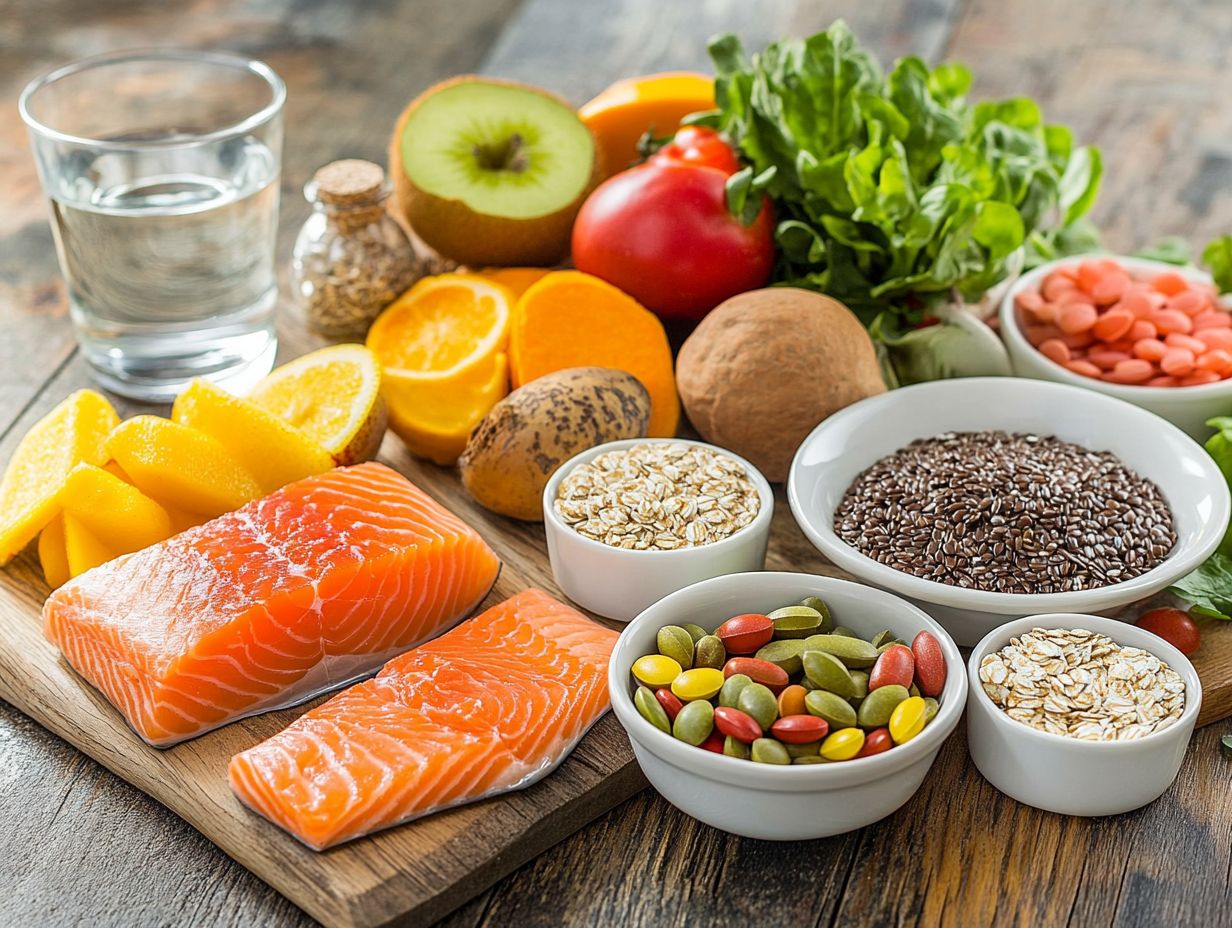
Embracing a diet abundant in a variety of foods is crucial for pregnant women. It provides essential nutrients necessary for both maternal health and optimal fetal development.
Foods to Include and Avoid
When planning your pregnancy diet, highlight foods rich in nutrients while recognizing those that should be avoided for the safety and health of you and your baby.
To support healthy fetal development, make a variety of fruits and vegetables the stars of your plate. They provide vital vitamins and minerals like folate, a type of B vitamin important for pregnancy, and vitamin C. Incorporating whole grains such as brown rice and quinoa will offer you the necessary fiber to aid digestion.
Don t forget about healthy fats from sources like avocados and nuts, which are crucial for brain development. Dairy products, such as yogurt or cheese, are fantastic for calcium, supporting your baby s bone health.
Avoid fish high in mercury like swordfish and king mackerel, along with processed meats that may harbor harmful bacteria. Emphasizing food safety practices, like thoroughly washing your produce and cooking meats to the right temperatures, is vital for maintaining good health during this pivotal time.
Managing Pregnancy-Related Food Aversions and Cravings
Managing food aversions and cravings during pregnancy can present a challenge. However, it s essential for maintaining adequate nutritional needs.
Adopting a thoughtful approach will help you cultivate a balanced and healthy eating pattern during this important time.
Tips for Dealing with Changes in Appetite
Adjusting to changes in appetite is a natural part of pregnancy. Taking a proactive approach to manage these shifts can help you and your baby enjoy a nutritious diet.
To navigate these fluctuations effectively, consider establishing a consistent meal frequency. Aim for small meals throughout the day rather than the traditional three-meal structure. Incorporating healthy snacks like fresh fruits, nuts, and yogurt can satisfy your cravings without sacrificing nutritional value.
Pay attention to your cravings; they can help you understand what your body needs. Indulging in a craving now and then can be perfectly fine, but maintaining a balance is essential. Get creative by including a variety of foods to make your meals enjoyable while ensuring you re meeting your nutritional requirements.
Healthy Meal Planning for Pregnant Women
Effective meal planning during pregnancy is crucial for maintaining a nutritious diet that caters to your specific needs and those of your growing baby. This approach fosters healthy eating habits and ensures a consistent intake of important nutrients vital for both your well-being and that of your little one.
Sample Meal Plans and Recipes
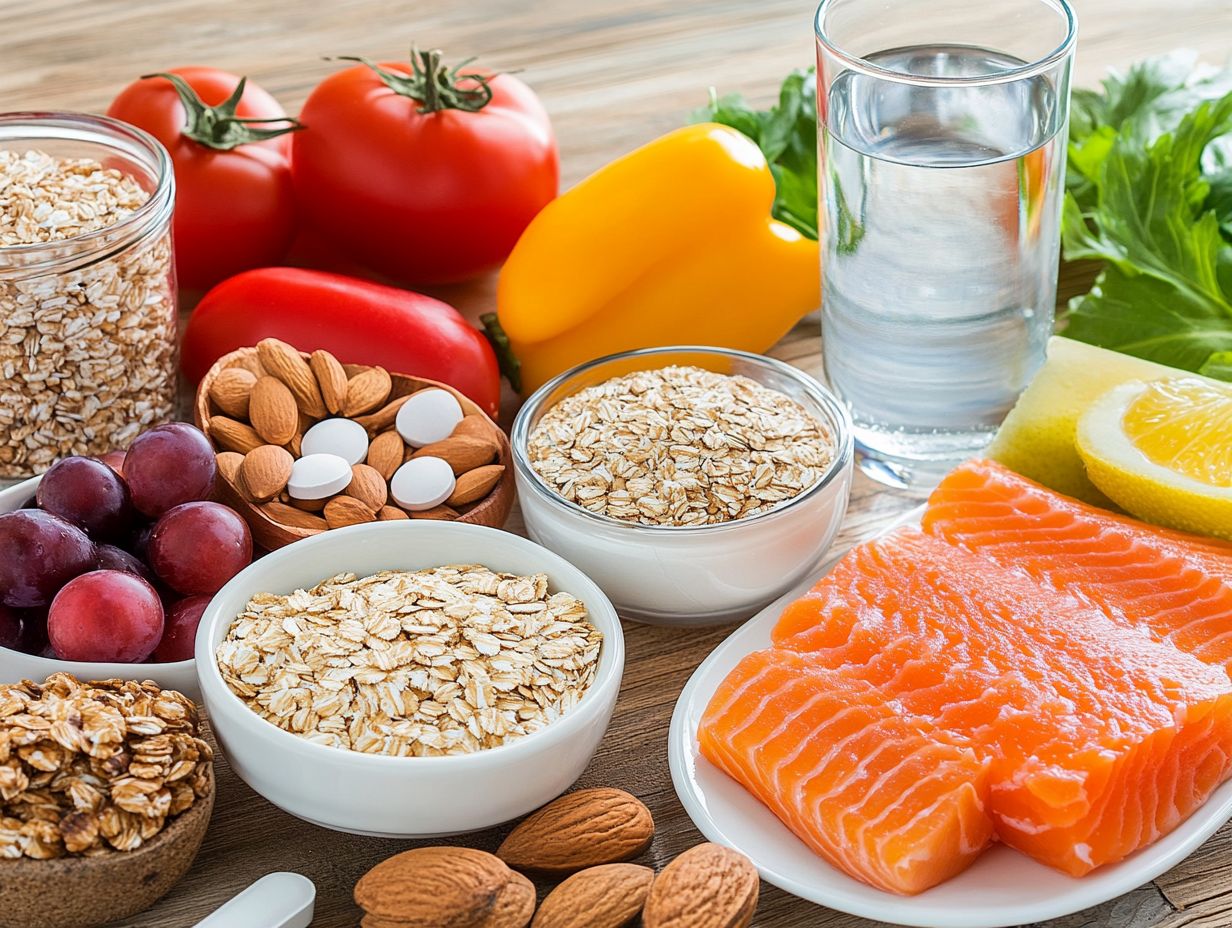
Sample meal plans and recipes specially designed for pregnant women can serve as invaluable resources. They help you maintain a well-balanced diet that meets your nutritional needs and promotes your overall health.
These plans present a variety of options that highlight the significance of important nutrients such as folate, iron, and calcium, particularly crucial during this transformative phase of your life. By incorporating a vibrant mix of fruits and vegetables alongside lean protein sources like chicken, fish, and legumes, you can nurture both your well-being and your baby’s development.
These meal ideas invite you to explore new flavors and textures, transforming healthy eating into a delightful experience. Picture hearty breakfast smoothies bursting with spinach and banana or nourishing quinoa bowls adorned with roasted vegetables and grilled chicken. Each recipe is thoughtfully crafted to support your pursuit of a vibrant, nutrient-rich lifestyle.
Supplements During Pregnancy
A balanced diet is essential during pregnancy, but supplements especially prenatal vitamins are vital for bridging nutritional gaps. They ensure optimal health for both you and your developing fetus, providing the extra support needed during this transformative time.
Start planning your meals today to ensure you and your baby thrive!
When and What to Take
Understanding when and what supplements to take during pregnancy is essential for ensuring that both you and your baby receive the vital nutrients needed for healthy development.
Taking supplements on time is important for your health during pregnancy. This is especially true in the first trimester when your baby’s organs develop.
As an expectant mother, you should prioritize prenatal vitamins that are rich in folic acid to help prevent neural tube defects. Additionally, iron supports the increased blood volume and fetal growth. Don’t overlook the importance of calcium for bone development and omega-3 fatty acids for brain health.
It’s wise to consult a healthcare professional to determine your specific needs and the optimal timing for these vitamins. This way, you can lay a strong foundation for both your well-being and that of your baby throughout this remarkable journey.
Consulting with a Healthcare Provider
Consulting with a healthcare provider is essential for pregnant women seeking expert guidance on nutrition, dietary recommendations, and overall pregnancy health.
This collaboration ensures the well-being of both mother and fetus, paving the way for a healthier pregnancy journey.
Importance of Professional Guidance
Professional guidance from healthcare providers offers you tailored advice that addresses your unique nutritional needs and health concerns throughout your pregnancy journey.
This personalized approach is crucial, as each woman’s experience of pregnancy is distinct, influenced by various health backgrounds and lifestyle factors that shape dietary requirements. By tapping into their expertise, healthcare professionals can help you navigate the complex world of nutrition, providing valuable insights on essential vitamins, minerals, and effective meal planning.
These providers are a reliable resource for any questions or uncertainties you may encounter, ensuring you feel supported and well-informed.
Their role extends beyond merely imparting knowledge; it s about fostering a collaborative relationship that enables you to make healthier choices, ultimately promoting the well-being of both you and your baby.
Frequently Asked Questions
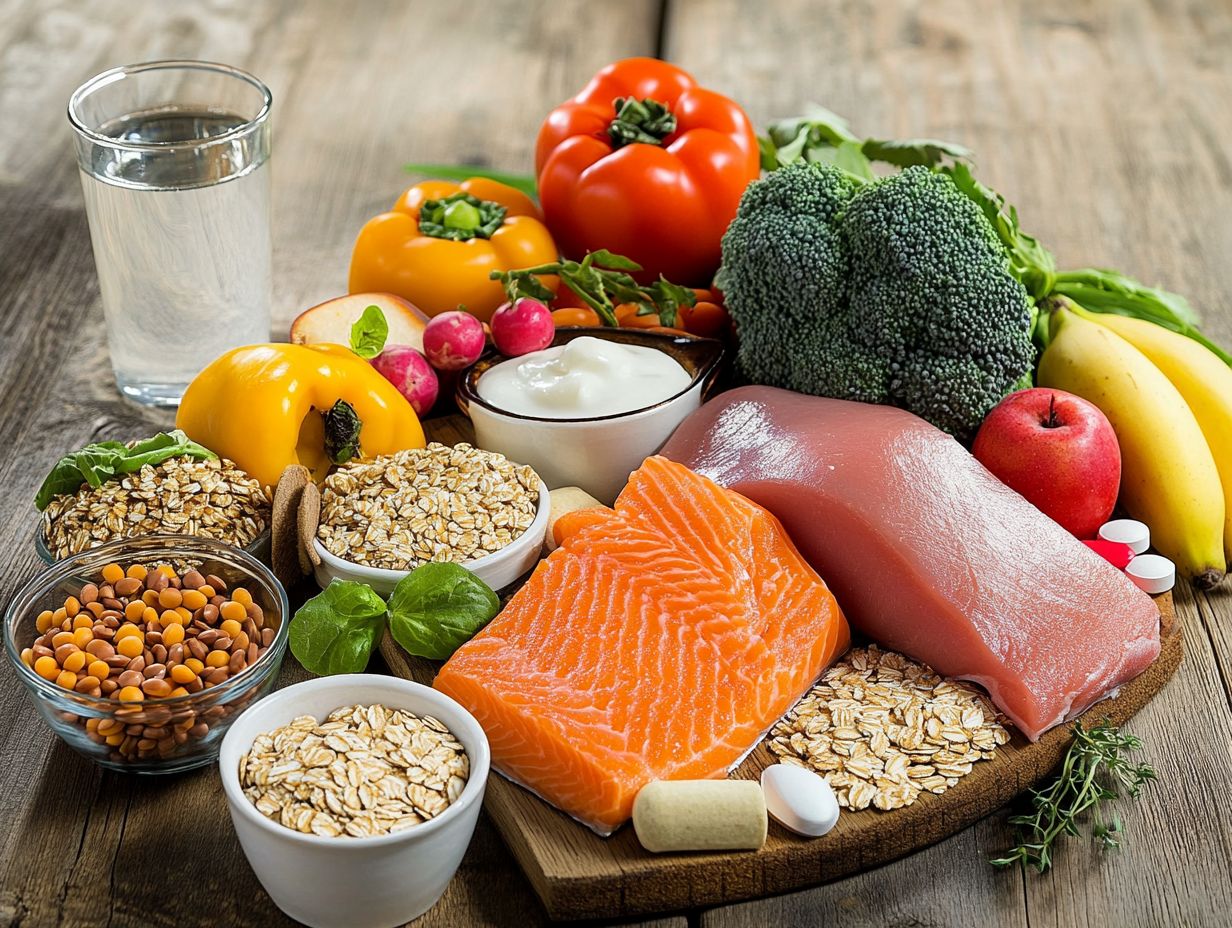
What should pregnant women eat to support a healthy pregnancy?
Eat a balanced diet rich in fruits, vegetables, lean proteins, and healthy fats.
Are there any specific foods that pregnant women should avoid?
Yes, avoid raw or undercooked meats, unpasteurized dairy products, and certain types of fish that are high in mercury.
Can pregnant women still eat seafood?
Yes, pregnant women can enjoy seafood. Choose low-mercury options like salmon, shrimp, and cod. Limit intake to 8-12 ounces per week.
What are some important nutrients for pregnant women to focus on?
Pregnant women should pay attention to folic acid, iron, calcium, and omega-3 fatty acids, as these nutrients are essential for the growth and development of the baby.
Can pregnant women follow special diets such as vegetarian or vegan?
Yes, as long as they ensure they’re getting all necessary nutrients for a healthy pregnancy. It is important to consult with a healthcare provider or registered dietitian to ensure all nutritional needs are met.
Is it okay to indulge in cravings during pregnancy?
It s okay to indulge in cravings occasionally, but maintain a balanced and healthy diet overall. Moderation is key when satisfying pregnancy cravings.

